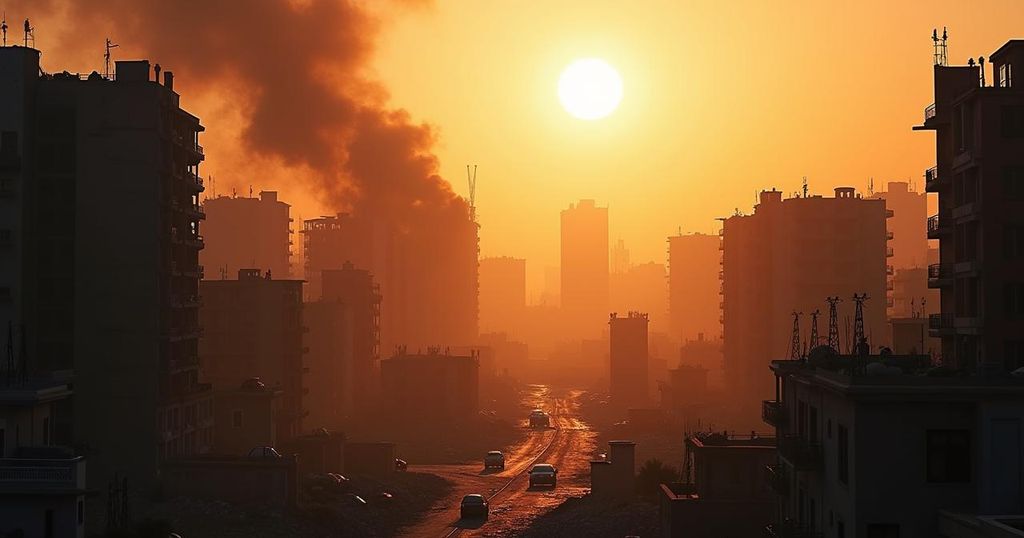Israeli air strikes on Beirut have caused significant casualties as Prime Minister Netanyahu asserts the need to eliminate Hamas and Hezbollah threats. The humanitarian situation escalates in Lebanon, with urgent calls for international support amid rising fatalities and displacement.
Recent air strikes by Israel on southern Beirut, specifically targeting the Dahiyeh suburb, have resulted in numerous casualties, with both dead and wounded reported. Following these attacks, Israeli Prime Minister Benjamin Netanyahu addressed the United Nations, asserting that Hamas must be eliminated to ensure reconstruction efforts in Gaza can proceed and to prevent future threats to Israel. He stated, “If Hamas stays in power, it will regroup… and attack Israel again and again and again…So Hamas has got to go.” Netanyahu further reiterated his commitment to degrading Hezbollah’s military capabilities, indicating that this would continue until Israel’s objectives along the Lebanon border are met, dampening chances for a negotiated ceasefire. He made a pointed comparison, stating, “Just imagine if terrorists turned El Paso and San Diego into ghost towns…How long would the American government tolerate that?” Globally, Netanyahu condemned Iran’s influence, warning that it poses a threat to the entire Middle East, and emphasized that Israel is prepared to respond to any aggression from Tehran: “If you strike us, we will strike you.” Crisis response in Lebanon has been dire, with over 41,000 fatalities in Gaza and 700 in Lebanon due to the ongoing conflict. Humanitarian operations have faced challenges, as Philippe Lazzarini, chief of the UN agency for Palestinian refugees, highlighted the need for sustainable funding in light of an $80 million shortfall. He warned, “UNRWA is a formidable tool at your disposal – I urge you to use it wisely.” The situation remains critical, with continuous Israeli air raids leading to civilian casualties and mass displacement, particularly in areas considered Hezbollah strongholds. Reports indicate that approximately 446 educational institutions have been repurposed as shelters for the displaced population. Imran Riza, the UN humanitarian coordinator in Lebanon, described the ongoing violence as catastrophic, stating, “We are witnessing the deadliest period in Lebanon in a generation, and many express their fear that this is just the beginning.” The humanitarian crisis has escalated to a level unprecedented in decades, raising concerns over further deterioration as both aid agencies and healthcare systems struggle to manage increasing numbers of casualties.
The geopolitical conflict in the Middle East, particularly involving Israel, Hamas, and Hezbollah, has intensified recently, leading to significant military actions and humanitarian crises. Israel’s recent air strikes have targeted various locations in Lebanon, escalating hostilities that have resulted in massive civilian casualties and displacement. In conjunction with these military operations, global leaders, including Israeli officials, are calling for stronger international responses to perceived threats from groups like Hamas and Hezbollah, as well as the role of Iran in the region. This complex dynamic is exacerbated by the humanitarian challenges faced by displaced populations, particularly in Lebanon, where ongoing violence has prompted urgent assistance from international agencies.
In summary, the conflict in the Middle East, marked by Israeli air strikes on Beirut and a strong military response from Israel against Hamas and Hezbollah, has intensified with grave humanitarian consequences. Prime Minister Netanyahu’s declaration at the UN underscores Israel’s determination to eradicate perceived threats, while the humanitarian situation deteriorates markedly in Lebanon. Urgent international attention and action are required to address not only the immediate violence but also the broader humanitarian crisis looming over the region as displacement and casualties continue to rise.
Original Source: www.aljazeera.com







